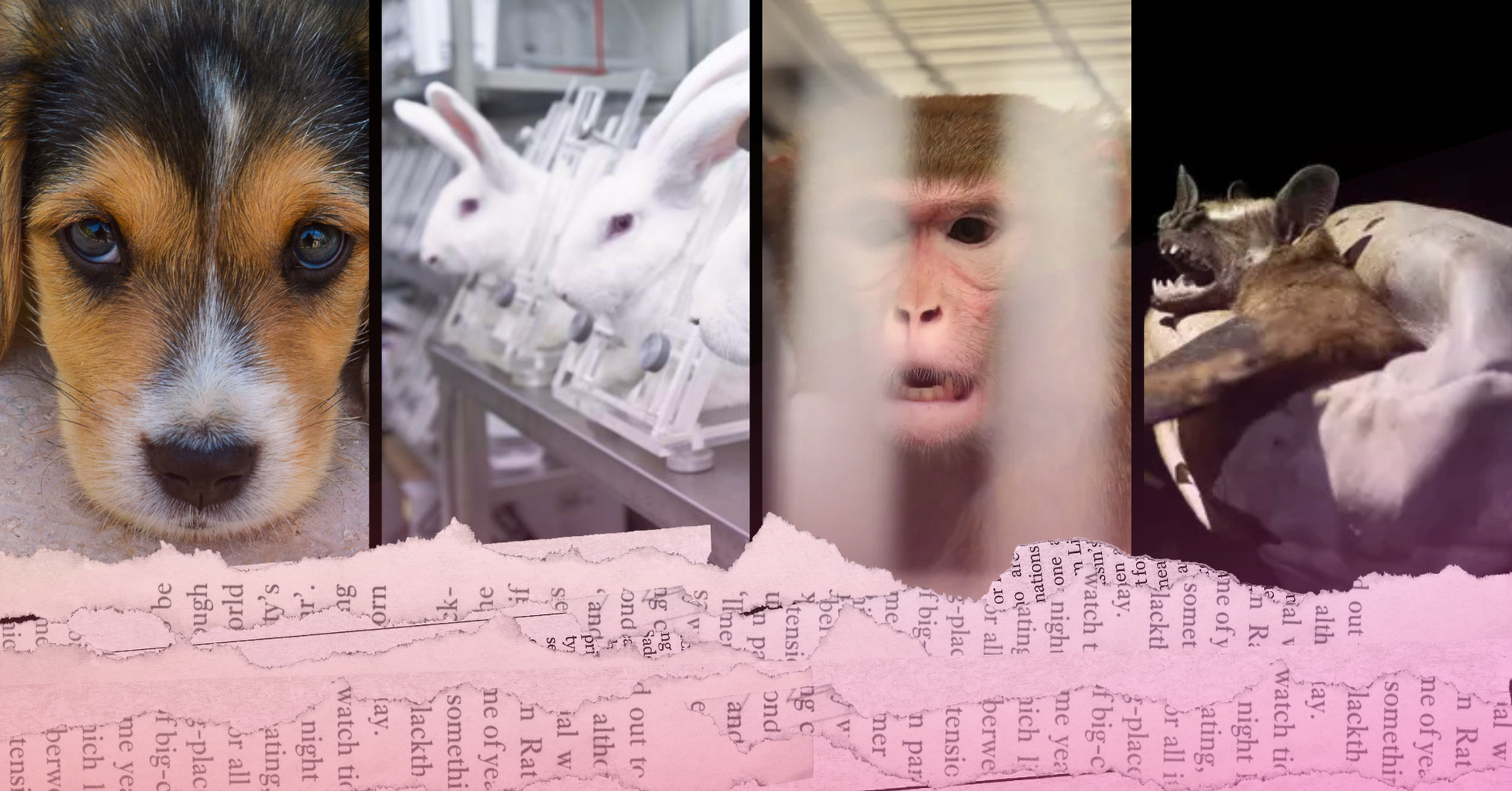
Here’s a roundup of the week’s biggest news stories related to animal research — all the recent media coverage you need to know right now to be the most effective activist for animals in labs.
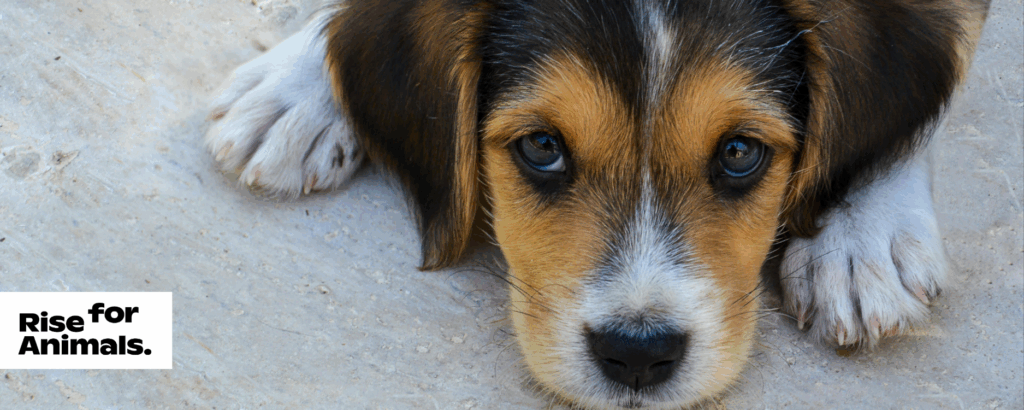 The USDA Doesn’t Even Require Veterinarians to Be Licensed
The USDA Doesn’t Even Require Veterinarians to Be Licensed
Rise for Animals, 10/15/2025
LOOPHOLE EXPOSED: An unlicensed veterinarian may oversee thousands of animals in a USDA-regulated facility—because, as it turns out, the agency doesn’t require that “attending veterinarians” be licensed.
The lead vet of Ridglan Farms—one of the U.S.’s largest breeders of dogs for experimentation—recently had their veterinary license suspended by state authorities for unprofessional conduct, negligence, and other offenses. But, because federal rules don’t require licensure, Dr. Richard Van Domelen’s emergency license suspension doesn’t automatically trigger any federal consequences. It also doesn’t prevent him from continuing as Ridglan’s “attending veterinarian.” 📰 Full Story →
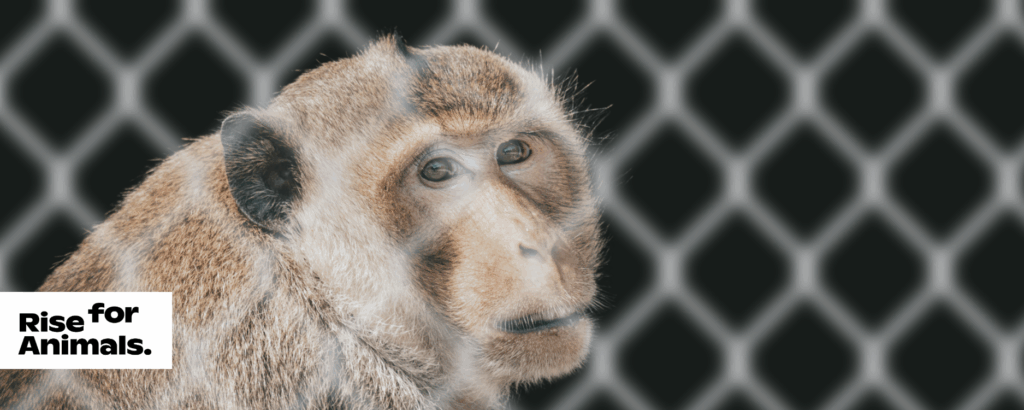 Feds Handed Over 1,296 Long-Imprisoned Monkeys to Industry
Feds Handed Over 1,296 Long-Imprisoned Monkeys to Industry
Rise for Animals, 10/14/2025
Learn how 1,296 long-tailed macaques, seized on suspicion of illegal trafficking, were handed over to Charles River Laboratories—exposing apparent government-industry collusion and ongoing risks to trafficked primates in U.S. labs. 📰 Full Story →
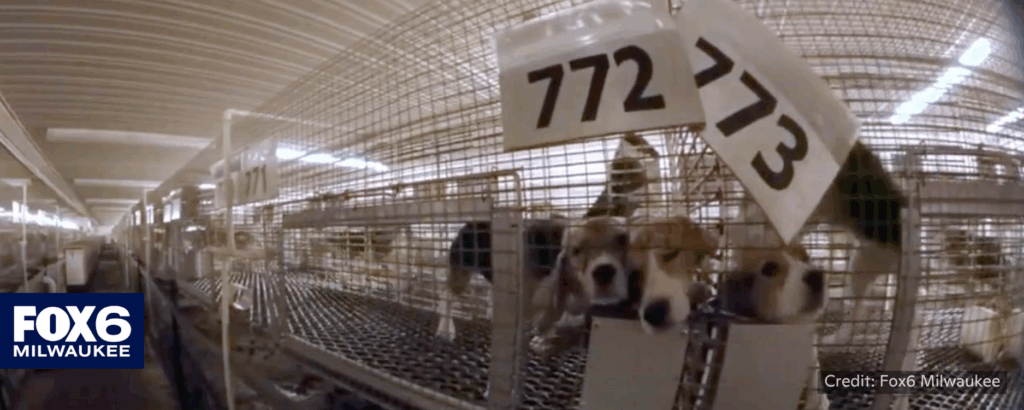 Wisconsin dog breeder sues activists, judge hears oral arguments
Wisconsin dog breeder sues activists, judge hears oral arguments
Bryan Polcyn, FOX6 Milwaukee, 10/9/2025
“Ridglan Farms breeds beagles for use in scientific experiments. In April, the breeder sued Dane4Dogs over a letter the activist group sent to the breeder’s customers. That letter ‘strongly encouraged’ customers to stop doing business with Ridglan Farms or find their names on a published listed [sic].”
“Both sides made oral arguments to a Dane County judge on Thursday, Oct. 9. Ridglan Farms called the letter extortion, while Dane4Dogs said it amounts to a boycott protected under the First Amendment.”
“Dane County Judge Jacob Frost promised to issue a ruling soon to decide whether the case will proceed to trial. Meanwhile, a criminal investigation into alleged animal cruelty at Ridglan Farms remains ongoing.” 📰 Full Story →
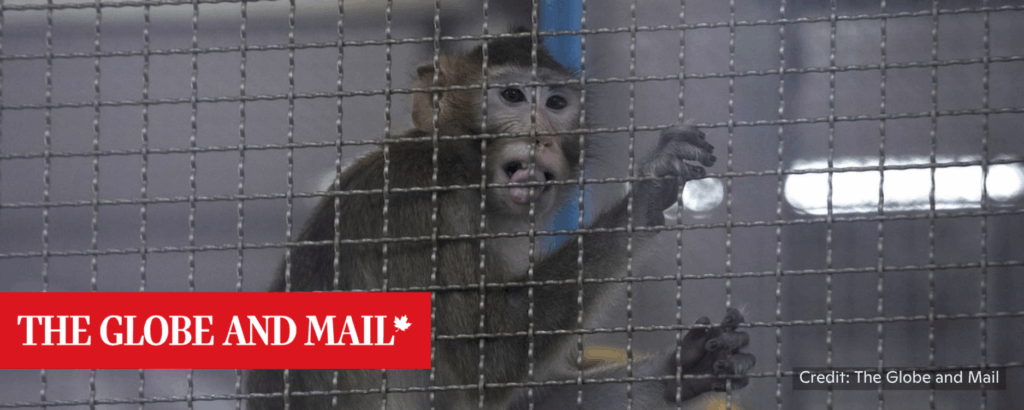 Canada imported nearly 1,800 endangered wild-caught monkeys for research, sparking calls for a ban
Canada imported nearly 1,800 endangered wild-caught monkeys for research, sparking calls for a ban
Marie Woolf, The Globe and Mail, 10/09/2025
“Canada has imported nearly 1,800 endangered wild-caught monkeys from Mauritius and Cambodia for use in testing and research since 2021, prompting calls from animal welfare advocates to ban the practice . . . They included 1,772 endangered long-tailed macaques captured from the wild in Mauritius, and 24 wild macaques imported from Cambodia.”
“‘The failure of Canada to follow [the example set by Britain and the EU in banning the import of wild-caught primates for use in research and toxicity testing] is a major setback for animal welfare. By allowing the import of wild-caught long-tailed macaques from Cambodia and Mauritius, Canada is contributing substantially to the cruelty and inhumanity of trapping and the decimation of the species in the wild,’….” 📰 Full Story →
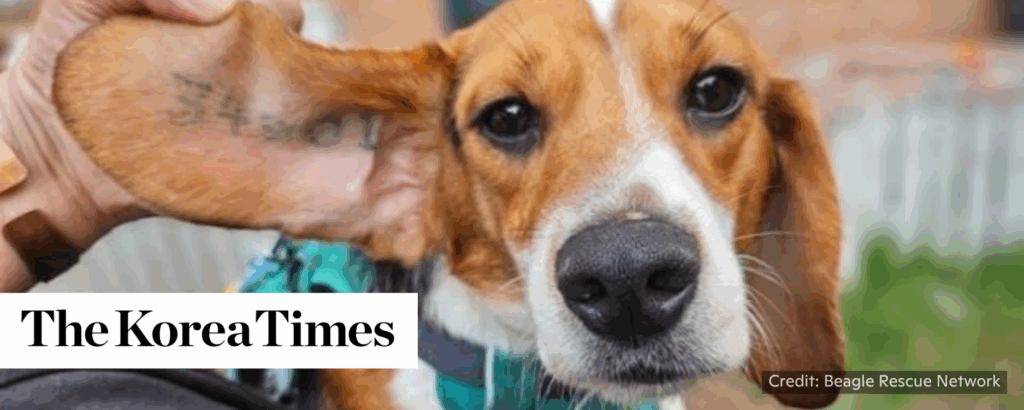 Rescued lab beagles to find new homes at adoption event in Seoul
Rescued lab beagles to find new homes at adoption event in Seoul
Youn Ye-jin, The Korea Times, 10/10/2025
“Beagles once confined to laboratories will be looking for their forever homes at a special adoption event . . . in Myeong-dong, one of Seoul’s most popular tourist and shopping districts.”
“‘Only about one out of every 10,000 beagles used in laboratory experiments ever make it out alive. It underscores how far we still have to go in ending animal testing and developing humane alternatives,’ a Beagle Rescue Network staff member told The Korea Times.”
“Alongside the festivities, the Beagle Rescue Network will conduct an anti-animal-testing petition, drawing attention to ongoing ethical concerns about laboratory research, including opposition to a proposed testing facility at Kangwon National University.” 📰 Full Story →
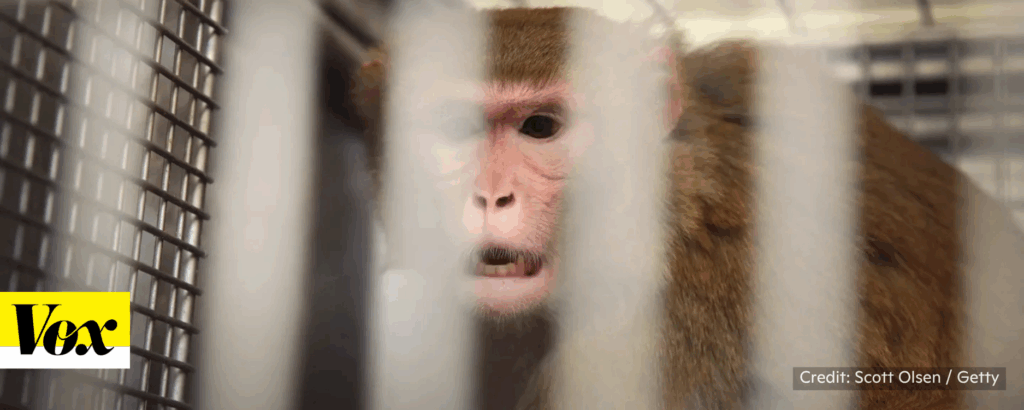 Animal abusers are getting let off the hook. Trump and his Supreme Court are partly to blame.
Animal abusers are getting let off the hook. Trump and his Supreme Court are partly to blame.
Kenny Torrella, VOX, 10/08/2025
“ . . . you’d think that if a company that uses animals is caught mistreating them, they [] would face some sort of legal repercussion. But for many businesses in the US, that’s not what’s happening.”
“ . . . the USDA’s enforcement has only gotten weaker in recent years . . . the root of the problem is that it often lets violators off easy: The department has long been criticized by both animal advocates and the US Office of Inspector General (OIG) – a government oversight agency – for terribly weak enforcement of the Animal Welfare Act. Stretching back to the early 1990s, the OIG has documented the USDA consistently failing to hold repeat violators accountable, along with significantly reducing fines (in the early 2000s, fines were reduced by an average of 86 percent). The resultant fines are so small – thousands of dollars instead of tens of thousands; or tens of thousands instead of hundreds of thousands – that many violators see them ‘as a normal cost of business, rather than a deterrent for violating the law,’ according to an OIG report.”
“[The Supreme Court’s 2024 ruling in Securities and Exchange Commission v. Jarkesy that “essentially stripped the [SEC] of its power to impose certain fines”] seems to have had a chilling effect on other agencies, including the USDA . . . ‘Jarkesy has hamstrung us the most,’ an anonymous USDA manager told Science magazine in August. ‘We have an inability to do anything, even when we see bad stuff.’”
“On the bright side, however, the Trump administration is at least — even if for the wrong reasons — trying to hack away at the core issue: reducing the number of animals used in experiments and moving toward non-animal methods.” 📰 Full Story →
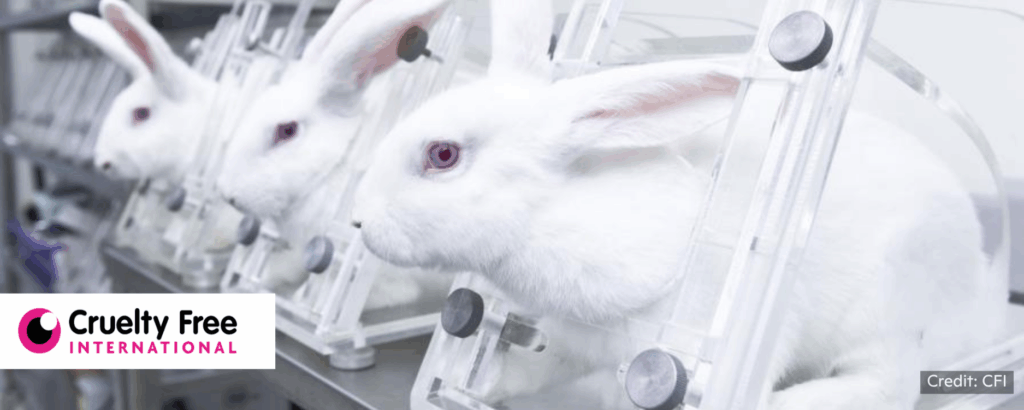 UK Animals in Science Committee Recommends Greater Transparency in Animal Testing
UK Animals in Science Committee Recommends Greater Transparency in Animal Testing
Cruelty Free International, 10/10/2025
“The UK Home Office has now received recommendations on improving public transparency on the use of animals in science, after [Cruelty Free International] contributed to a report written by the Animals in Science Committee (ASC), an advisory body to the UK government.”
“[ASC’s] recommendations include: creating a list of key technical terms to make complex issues more understandable to the public; helping applicants include enough detail on the tests to be performed and potential suffering they will involve; and developing a searchable database in which to publish the documents to improve public accountability.” 📰 Full Story →
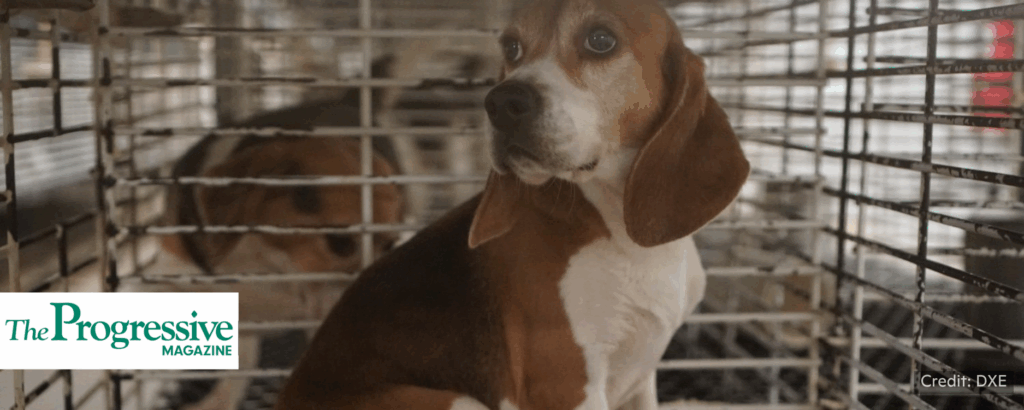 Book Review: Toward an End to Using Dogs in Research
Book Review: Toward an End to Using Dogs in Research
Bill Lueders, The Progressive Magazine, 10/13/2025
“While Lab Dog: A Beagle and His Human Investigate the Surprising World of Animal Research thankfully does not have many [graphic] depictions, the pain and deprivation inflicted on the tens of thousands of dogs that to this day are being used for research is never out of mind. The book, which the late Jane Goodall pronounced ‘heartbreaking and hopeful,’ is a deep dive into a world most Americans know nothing about, often by choice, as they shower love on their own canine companions.”
“If there is hope for other dogs who endure miserable caged existences in breeding facilities and research labs, it resides in the fact that every dog person, upon hearing this story, can relate.”
“Toward the end of her book, Kaplan takes a stab at identifying who is responsible for the fact that research on dogs and other animals in research is still going on. It is, well, all of us. As she writes: ‘We pay tuition to universities experimenting on animals. We elect officials who support funding animal research over alternatives. We pay taxes that support biomedical research on living beings. We buy pesticides and cleaners and drugs without thinking about the animals they were tested on . . . . We humans are the ones who breed and confine and experiment on dogs.’ And we are the ones who can make it stop.” 📰 Full Story →
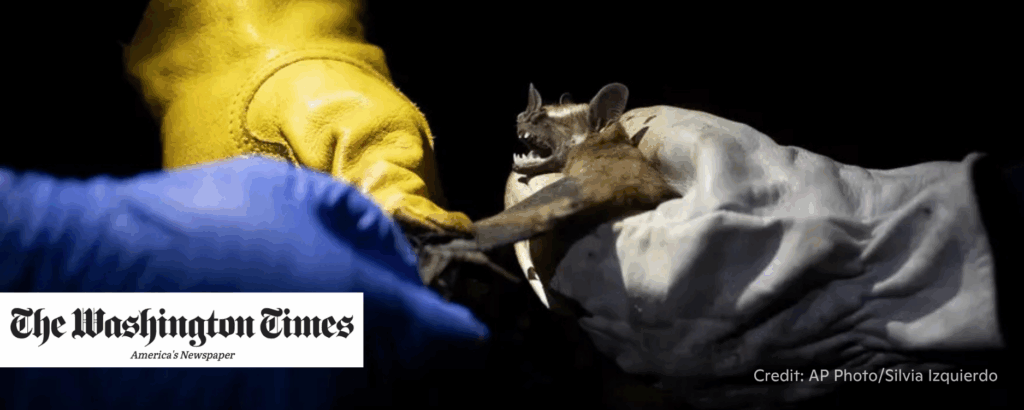 Trump’s NIH plows ahead with bat lab to fuel virus research in U.S.
Trump’s NIH plows ahead with bat lab to fuel virus research in U.S.
Stephen Dinan, The Washington TImes, 10/14/2025
“The Trump administration is moving to wind down many taxpayer-funded animal experiments, but a controversial bat virus lab in Colorado is powering forward with a new infusion of millions of dollars. The lab is being built at Colorado State University in Fort Collins. It is intended to host a breeding colony for bats that can be used for virus research in the U.S., including a who’s who of menacing viruses such as Ebola, Nipah and coronaviruses. The lab said it would conduct some testing itself and provide bats for other domestic labs.”
“NIH approved the money even though its new director, Jay Bhattacharya, was critical of the lab’s idea a year ago. ‘I don’t understand how do you prevent a pandemic with this research,’ he said in a Twitter Spaces appearance with members of the community in Fort Collins and the White Coat Waste Project….” 📰 Full Story →
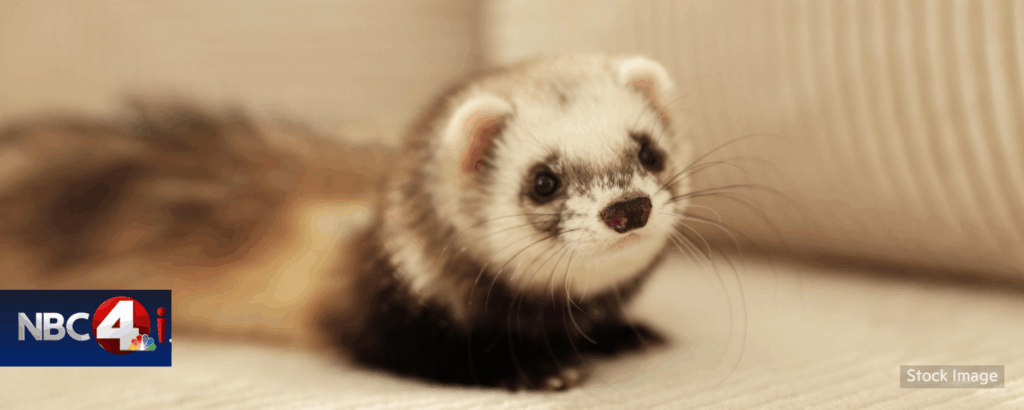 USDA issued warning to Ohio State after death of 16 animal test subjects
USDA issued warning to Ohio State after death of 16 animal test subjects
Katie Millard, NBC4, 10/15/2025
“Federal inspectors found researchers working at Ohio State University facilities improperly treated 30 animals, leading to . . . the deaths of 15 baby ferrets and one pig.”
“In August, the USDA found Ohio State did not provide adequate veterinary care to 29 baby ferrets over the course of two experiments. According to inspection reports, the USDA said the baby ferrets were weak, not fed appropriately and suffered ‘significant weight loss.’ Between October 2024 and March 2025, the USDA said 15 baby ferrets were found dead or had to be euthanized.”
“The USDA also looked into the February death of a pig in OSU’s care. The USDA found a pig went into cardiac arrest while undergoing anesthesia, which was administered incorrectly.” 📰 Full Story →
 US beauty industry returns to Capitol Hill with focus on MoCRA, non-animal testing, tariffs, OTC reform
US beauty industry returns to Capitol Hill with focus on MoCRA, non-animal testing, tariffs, OTC reform
Cassandra Stern, CosmeticsDesign, 10/15/2025
“Industry leaders from the U.S. cosmetics and personal care sector gathered on Capitol Hill last month to reconnect with lawmakers and reinforce key policy priorities . . . Non-animal testing continues to be a high priority for the industry, with growing support on Capitol Hill for legislation that would formalize its use and expand federal acceptance of new safety assessment tools.”
“[Karin Ross, executive vice president of government affairs at the Personal Care Products Council] pointed to the Humane Cosmetics Act and OMUFA reauthorization as two immediate opportunities to move the issue forward. ‘If passed, the HCA would align U.S. regulations with those of other countries that have adopted animal test bans or regulatory frameworks that emphasize the use of non-animal testing methods.’” 📰 Full Story →
Share this news compilation on X or Bluesky.
Or copy, paste, and share this link on Facebook or anywhere else:
riseforanimals.org/news/news-oct-17-2025